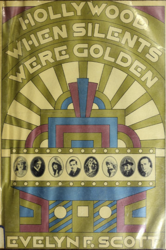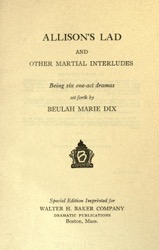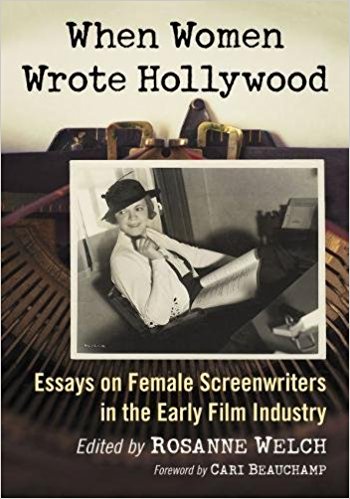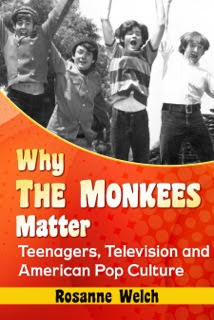Running Down the Rabbit Hole of Research
 It’s always fun to fall into the rabbit hole of research. It always teaches me new things about other eras, along with reminding me that one of the ways women disappear in history. They change their names, making it harder and harder to find them. I was reminded of this as I was writing a column on novelist turned silent screenwriter Beaulah Marie Dix. In one of many short bits about her online, I found mention of daughter Evelyn Flebbe Scott on the very helpful Women Film Pioneers Project. There, I also found that Evelyn had herself become “an industry writer” and had written a Hollywood memoir, Hollywood When Silents Were Golden (Internet Archive) that can also be ordered from the Los Angeles Public Library.
It’s always fun to fall into the rabbit hole of research. It always teaches me new things about other eras, along with reminding me that one of the ways women disappear in history. They change their names, making it harder and harder to find them. I was reminded of this as I was writing a column on novelist turned silent screenwriter Beaulah Marie Dix. In one of many short bits about her online, I found mention of daughter Evelyn Flebbe Scott on the very helpful Women Film Pioneers Project. There, I also found that Evelyn had herself become “an industry writer” and had written a Hollywood memoir, Hollywood When Silents Were Golden (Internet Archive) that can also be ordered from the Los Angeles Public Library.
An online search for Evelyn Scott led to a southern novelist – Evelyn Scott (born Elsie Dunn) – so not the Evelyn Scott I was researching. Luckily, I had my Evelyn Scott’s father’s name, so I added the Flebbe to the search, and that’s when Evelyn Flebbe Scott came up on Goodreads as the author of 2 children’s books + the aforementioned memoir. It also gave the next tidbit, giving me her father’s profession: “was the daughter of screenwriter/author Beulah Marie Dix and book importer Georg Heinrich Flebbe” along with the explanation of where ‘Scott’ came from: “She married film editor David Scott in 1935” AND, the confirmation that “Evelyn F. Scott worked for decades in Hollywood as a story editor at MGM.”
 Then, in looking up a tiny smidgen of a clue on IMDB – that she had a play that “the Technicolor Corporation to be adapted as one of their Great Events short color film series” I searched the play’s title Allison’s Lad in IBDB, the Internet Broadway Database – it wasn’t listed. So I broadened to a larger search and found it listed on a new fun site: The Unknown Playwrights site “Where unknown playwrights become known”.
Then, in looking up a tiny smidgen of a clue on IMDB – that she had a play that “the Technicolor Corporation to be adapted as one of their Great Events short color film series” I searched the play’s title Allison’s Lad in IBDB, the Internet Broadway Database – it wasn’t listed. So I broadened to a larger search and found it listed on a new fun site: The Unknown Playwrights site “Where unknown playwrights become known”.
There I learned that “Dix had a thing for history and wars” and the one-act “is set during the bloodletting known as The English Civil War” and “appears in a volume of one-acts set entirely during wartime.” Their Link Heaven took me to the Internet Archive where a printed copy of the play had been scanned.
Now I need to read some books on the MGM scenario department to see if Evelyn worked with Kate Corbaley, the famous head of the story department at MGM in the 1930s, who you can read more about here – How Kate Corbaley, Powerful Reader at MGM in the 1930s, Paved the Way for Today’s Hollywood Literary Scouts.
That’s a tiny example of the rabbit hole of research one can hop into and like Alice in Wonderland, find oneself racing through all sorts of interesting eras and fascinating lives.






![Anita Loos: An Introduction with Dr. Rosanne Welch, Stephens College MFA in TV and Screenwriting and the Retroformat Silent Film Society [Video]](https://rosannewelch.com/wp-content/uploads/2023/01/rmw-retroformat-loos.jpg)


![From Women in Early TV for the American Women Writers National Museum [Video]](https://rosannewelch.com/wp-content/uploads/2022/04/rmw-visible-stars-early-tv-19.jpg)

![18 Joanna Lee & Madeline Anderson From Women in Early TV for the American Women Writers National Museum [Video]](https://rosannewelch.com/wp-content/uploads/2022/04/rmw-visible-stars-early-tv-18.jpg)
![17 Even More On Treva Silverman From Women in Early TV for the American Women Writers National Museum [Video]](https://rosannewelch.com/wp-content/uploads/2022/03/rmw-visible-stars-early-tv-17.jpg)
![16 More On Treva Silverman From Women in Early TV for the American Women Writers National Museum [Video]](https://rosannewelch.com/wp-content/uploads/2022/03/rmw-visible-stars-early-tv-16.jpg)
![15 Treva Silverman From Women in Early TV for the American Women Writers National Museum [Video]](https://rosannewelch.com/wp-content/uploads/2022/03/rmw-visible-stars-early-tv-15.jpg)